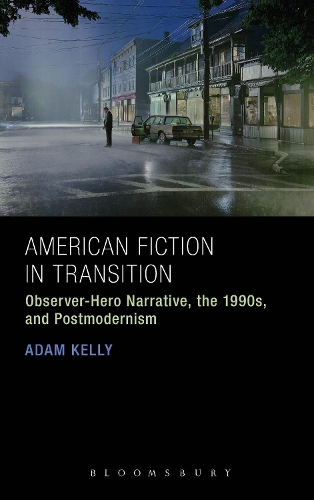
American Fiction in Transition: Observer-Hero Narrative, the 1990s, and Postmodernism
(Hardback)
Available Formats
Publishing Details
American Fiction in Transition: Observer-Hero Narrative, the 1990s, and Postmodernism
By (Author) Dr. Adam Kelly
Bloomsbury Publishing PLC
Bloomsbury Academic USA
20th June 2013
United States
Classifications
General
Non Fiction
Literary studies: c 1900 to c 2000
813.5409
Physical Properties
Hardback
176
370g
Description
American Fiction in Transition is a study of the observer-hero narrative, a highly significant but critically neglected genre of the American novel. Through the lens of this transitional genre, the book explores the 1990s in relation to debates about the end of postmodernism, and connects the decade to other transitional periods in US literature. Novels by four major contemporary writers are examined: Philip Roth, Paul Auster, E. L. Doctorow and Jeffrey Eugenides. Each novel has a similar structure: an observer-narrator tells the story of an important person in his life who has died. But each story is equally about the struggle to tell the story, to find adequate means to narrate the transitional quality of the hero's life. In playing out this narrative struggle, each novel thereby addresses the broader problem of historical transition, a problem that marks the legacy of the postmodern era in American literature and culture.
Reviews
The book evinces Kellys expertise at tracing the genealogy of a literary or theoretical field. His handling of Derrida is particularly impressive, aligning analysis of each novel with a relevant Derridean concept secrecy, testimony, narcissism, and justice whilst displaying a flair for synthesizing complex ideas without being reductive. Moreover, his close readings are assured, marrying extensive critical knowledge with original insights, and sophisticated yet lucid syntax. In simultaneously attempting to define a literary genre, characterize a historical era, and posit theoretical developments after postmodernism, Kelly is attempting to do a great deal in such a slender volume, and yet he handles his tripartite project with aplomb, abetted by his clear writing style and convincing methodology. On the whole, this ambitious book is an enlightening and challenging contribution to nascent studies of the 1990s, and of post- postmodernism. -- Iain Williams (University of Edinburgh, UK) * U.S. Studies Online *
American Fiction in Transition is a major contribution to the understanding of a recent period in American literature. Lucid and engaging, Kelly combines close reading with a deep attention to questions of historical, cultural, and political context. Refuting the opposition between formalism and historicism, Kelly breaks new ground in literary studies, and shows how detailed attention to texts can illuminate seminal philosophical and political questions. This debut by a compelling new voice is an event not to be missed. -- Martin Hgglund, Yale University, USA
Characterised by an assured internalisation of theoretical frameworks, Adam Kelly has produced innovative, agenda-setting arguments about the conception of the 1990s as a transitional era within American fiction, based on the genre of the observer-hero narrative. Supported by substantial scholarship, the analytical work that goes into identifying the paradigmatic nature of this narrative at periods of literary transition, results in a compelling account of literary history and the literary forms that emerge at particular junctures in that history. Seeking to renew the critical lexicon for understanding what comes after postmodernism, Kellys investigations into questions about agency and ethics offers a literary historicism that is usefully conjoined with relevant contemporary philosophical concerns. -- Tim Woods, Dean, Faculty of Arts, and Professor of English and American Studies, Aberystwyth University, Wales, UK
Author Bio
Adam Kelly is Lecturer in American Literature at the University of York, UK. He previously taught at Harvard University, where he was a postdoctoral fellow, and at University College Dublin. He is the author of American Fiction in Transition: Observer-Hero Narrative, the 1990s, and Postmodernism (Bloomsbury 2013), as well as numerous articles in edited collections and in journals including Twentieth-Century Literature, Studies in the Novel, Critique, and Philip Roth Studies.
